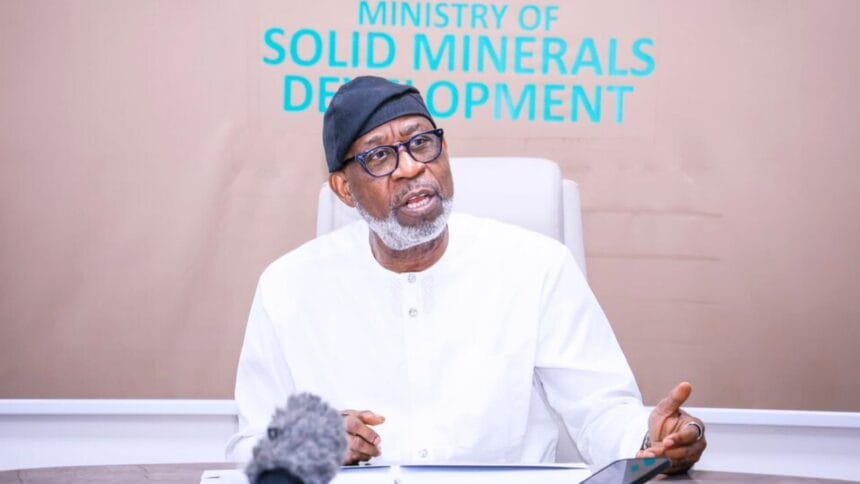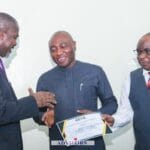…Dr. Dele Alake’s key milestones in just 14 months
Oredola Adeola
In just 14 months, Dr. Dele Alake’s leadership at the Ministry of Solid Minerals Development has, through decisive reforms and collaborative efforts, made significant strides in curbing illegal mining, attracting investments, and surpassing revenue targets, thereby setting the sector on a new path of growth and innovation.
Advisors Reports’ check showed that the newly established Nigeria Solid Minerals Corporation (NSMC) initiated by Dr. Alake, secured budget approval, equipping it to improve operational efficiency and strengthen governance across the industry.
This development marks an important step toward building a more transparent and well-regulated mining sector.
As part of measures to combat illegal mining, the Ministry, in partnership with the Ministry of Interior, deployed 2,350 mining marshals nationwide.
These marshals act as field operatives ensuring compliance with regulations, addressing illegal activities, and safeguarding Nigeria’s mineral wealth.
Alake speaking on that development said, “Illegal miners have met their match this time.”
Advisors Reports further gathered that between May 2023 and April 2024, the ministry generated ₦16.3 billion, surpassing its target of ₦10.5 billion.
Additionally, the Economic and Financial Crimes Commission (EFCC) recovered ₦2.7 billion from illegal mining operations in Nasarawa State through court-ordered forfeitures.
These funds, according to the Ministry will be reinvested in infrastructure projects, job creation, and community development programmes.
Document from the Ministry also showed that the Nigeria Mining Cadastre Office has transitioned to a fully digital platform.
Advisors Reports gathered that the digitalization initiative allows real-time processing and archiving of mineral title documents, making the application process more accessible and efficient.
As of May 2024, the platform had received 10,534 applications, including 5,883 from international investors, indicating growing global interest in Nigeria’s mining opportunities.
The Ministry has also taken bold steps to ensure active participation in the sector by revoking 1,619 mining licenses for non-payment of fees and 913 titles for inactivity.
This action aligns with the ministry’s goal of ensuring that only committed operators hold mining rights, thereby promoting growth and economic contributions.
Dr. Alake’s leadership- in the period under review- has attracted over 50 foreign direct investments and more than 100 domestic investors.
The Ministry revealed that these investments target strategic minerals such as tin, lithium, and precious metals, positioning Nigeria as an emerging player in the global solid minerals market.
It is also focused on enforcing key statutory regulations, including Community Development Agreements (CDA) and land reclamation efforts. These initiatives aim to ensure that host communities benefit from mining activities, promoting both social stability and environmental sustainability.
Collaborations with the National Boundary Commission have resolved disputes over overlapping mining licenses, easing tensions in affected areas.
Dr. Alake noted the historical challenges posed by arbitrary colonial boundaries, highlighting the importance of administrative clarity in fostering seamless operations in mining zones.
In a final push to build investor confidence, the Ministry has centralized the collection and management of geological data.
This initiative ensures that investors have access to accurate and reliable information, facilitating informed decision-making and attracting further investment into the sector.
Through these strategic interventions, Dr. Dele Alake has laid a solid foundation for long-term growth and stability in Nigeria’s solid minerals sector, setting the stage for the country’s emergence as a competitive force in the global mining industry.
To enhance business-friendliness, the Nigerian Geological Survey Agency has centralized the management of geological data, making critical information easily accessible to investors. This initiative aims to streamline exploration efforts and attract more investments.
Dr. Alake emphasized the importance of comprehensive geological data, stating, “Heavy investment in exploration is crucial,” as it guides investors toward making informed decisions.
In a forward-thinking effort to modernize the sector, the ministry is also exploring the tokenization of Nigeria’s mineral assets. This innovative approach involves creating digital tokens that represent ownership shares in mining assets, enabling both local and foreign investors to trade securely and transparently.
Alake explained that this initiative would “democratize access to Nigeria’s wealth,” aligning with the ministry’s goal of fostering an inclusive and technology-driven mining industry.
The renewed focus on solid minerals is already benefiting several states across the country. Imo State, for example, has become a prominent case study, leveraging its vast mineral resources.
The state’s Okigwe Local Government Area is rich in lead, zinc, and limestone, while Ideato LGA contains deposits of laterite. Ohaji LGA holds reserves of gypsum along with oil and gas, expanding the state’s economic potential.
Additionally, the abundance of sand resources in Oguta supports construction and industrial activities, contributing to Imo’s growing role in the solid minerals sector.
These developments reflect the ministry’s commitment to harnessing Nigeria’s mineral wealth effectively while driving regional economic growth and modernizing mining practices nationwide.




